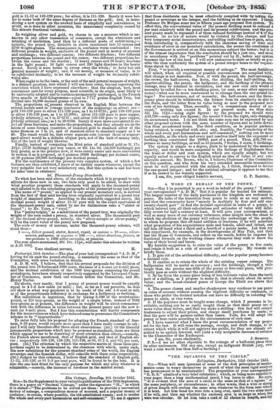Elm Cottage, Bewdley, 9th October 1855.
Sin—In the Supplement to your valuable publication of the 29th September, there is a paper on "Decimal Coinage," under the signature "H.," in which it is stated—"The problems to be solved are these : to provide a convenient money of coinage, a compendious money of account, and a popular money of parlance ; to retain, where possible, the old-established names ; and to render the whole and every part harmonious mid self-consistent." To me it appears
that these desiderata can be most effectively complied with by taking the pound or sovereign as the integer, and the farthing as its exponent. I think Professor De Morgan some ten or fifteen years ago proposed this system. To abet this, the conventional value of the present farthing must be reduced 4 per cent relatively with the pound and its present subdivisions, and the pre- sent penny made to represent 5 of these reduced farthings instead of '4 of the present. As no law of nature would be violated by this change, and but very temporary social inconvenience, and trifling individual loss or gain, arise from introducing it, comparatively with the immense saving of time and avoidance of error in our monetary calculations, the sooner the conclusion of the Government is arrived at on this momentous subject the better; but it is of the utmost importance that the conclusion should be a just one, and most in accordance with the "problems " pointed out by H., before any system becomes the law of the land. I will now endeavour to state as briefly RS pos- sible the close conformity the system of a pound integer bears to the requisi- tions stated by H. First, "to provide a convenient money of coinage." The most fastidious will admit, when all required or possible conveniences are complied with, that change is not desirable. Now,. if with the pound, the half-sovereign, the crown, the half-crown, the form, the shilling, the half-shilling, the quarter-shilling, the penny, the halfpenny, and the farthing of the present coinage, may be retained in circulation, and one new coin only would of necessity be called for—a ten-farthing piece, (or cent, orany other approved name)—what can be more convenient as to coinage than. the one-pound in- teger. For convenience, not of necessity, the half-crown and the three- penny piece should be withdrawn, the former from its similarity in size to the &am, and the latter from its value being so near to the proposed new coin of ten farthings. Then, secondly, as "a compendious money of ac- count," nothing can, exceed it. In our present mode, we thus state 551. Ms. llfc/.—using eight figures : by the proposed we should state L55799—using only five figures; the second 9 from the right, only changing its accustomed name. I do not think the same sum an be expressed by any other proposed system with the same number of figures and so little devia- tion from accustomed' terms. The third condition, as to popular parlance being retained, is complied with also ; and, fourthly, the "rendering of the whole and every part harmonious and self-consistent," nothing can be more conformable, as the whole and every part resolves itself into the exponent or farthing thus constituted the 1000th part of a pound. Thus, £55,799 ex- presses so many farthings, as well as 55pounds, 7 florins, 9 cents, 9 farthings. The system is simple to a degree, plain to be understood by the meanest capacity, and would be more congenial to the feelings of Englishmen than the franc or dollar and cent system, which are equally simple, but not equally suited to convey to the English mind an idea of value of any con- siderable amount. Mr. Brown, who is, I believe, Chairman ofthe Committee on this question, and who from his very extended- mercantile transactions must be well acquainted with the subject, is, I think, disposed to favour the one-pound integer; and for the national advantage it appears to me that if so he cannot be too warmly supported.
I am, Sir, your obliged humble servant,. C. P. 134.=0-


































 Previous page
Previous page